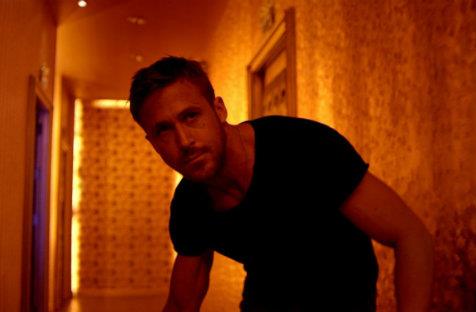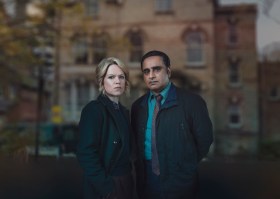Nicolas Winding Refn understands the value of images over dialogue, his nine-strong catalogue of acclaimed features dripping with the deliberation of distinctive visuals and seething with the statement of persistent quiet. Only God Forgives may push his predilection for visceral austereness to its most extreme, eclipsing the starkness of Valhalla Rising and the stylisation of Drive; however there’s method to the writer/director’s mesmerizingly minimalistic madness. In the icy calm and calculation of each sparsely furnished but richly textured scene, words are unmistakable in their purpose, but it is actions and intentions that truly resonate.
The brooding looks of Julian (Ryan Gosling, The Place Beyond the Pines) guide the audience through Winding Refn’s carefully constructed world of revenge and restraint, with the boxing club owner placed – and not by choice – at the centre of a spiralling cycle of violence. When his lecherous older brother Billy (Tom Burke, TV’s The Hour) is murdered for unseemly activities of misogyny, family matriarch and dangerous drug kingpin Crystal (Kristin Scott Thomas, In the House) arrives from the USA with retribution on her mind, pitting Julian against a sword-savvy local cop (Vithaya Pansringarm, The Hangover Part II) resolved to restore order to Bangkok’s brutal criminal underworld.
That Julian’s reluctant mission is predicated upon the whims of the blood-thirsty, expletive-spewing, scene-stealing Crystal is far from inconsequential, in a film that emphasizes the impact of strong parental ties. The seediness of brawls, brothels and drug deals may provide Winding Refn’s story with context, but it is the unbreakable bonds of blood that fuel this Oepidal-infused morality tale; a mother savagely dominates one son while sorrowfully mourning for another, a desperate father rues a cruel loss dictated by necessity, and the enigmatic, all-seeing policeman – driven by undying devotion to his own adolescent daughter – tellingly ensures their deeds are not without their price.
Under the patient gaze of cinematographer Larry Smith (reteaming with Winding Refn after Fear X and Bronson), the complexity of damaged characters and distressing relationships rages in exchanged glances and savoured moments, with every surreal instance of inner turmoil and outer uncertainty afforded the luxury of time to unfold. Peering down hallways, lurking in corners and observing from afar while still eliciting an unrelenting intimacy, the red and blue-tinted imagery tells a tale of impending destruction and unattainable forgiveness that dialogue merely complements, awash in a cinematic atmosphere of aggression and existentialism.
Cliff Martinez’s (Spring Breakers) moody electronic score increases the unavoidable air of foreboding that infiltrates every lengthy shot and sporadic outburst of carnage, augmenting the insistent intensity that lingers beneath the exquisite visuals. Yet, it is Gosling, seemingly in passive mode but evidently a cypher for the film’s conflict between nastiness and nuance, who best serves the subtle, stoic evocation of impossible redemption. Careening yet composed, his poise and polish embodies the ravishing focus and revelatory finesse that makes Only God Forgives a pulsating, potent patchwork of silence and vengeance.
Rating: 4 stars out of 5
Only God Forgives
Director: Nicolas Winding Refn
France/Thailand/USA/Sweden, 2013, 90 mins
Sydney Film Festival
5 – 16 June
Distributor: Icon
In general release 18 July
Actors:
Director:
Format:
Country:
Release:





